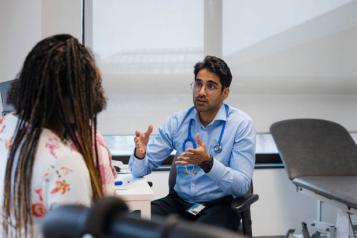Take three simple steps to reduce your cervical cancer risk

Women and people with a cervix are being encouraged to take three easy steps to significantly reduce their risk of developing cervical cancer, as part of Humber and North Yorkshire Cancer Alliance’s #PreventCervicalCancer campaign.
It is estimated that one in 142 females or people with a cervix will be diagnosed with cervical cancer in their lifetime. But with almost all (98.8%) cervical cancer cases being preventable, you can reduce your risk by following these steps.
1. Attend your cervical screening appointment and get vaccinated against human papillomavirus
Cervical screening, also known as a smear test, is a test to prevent cancer. It looks for conditions that may lead to cervical cancer, which can be detected years before cancer develops.
Cervical screening and human papillomavirus vaccination are the best ways to protect yourself from cervical cancer.
The cervical screening appointment takes no more than 10 minutes and the test itself is over in a matter of minutes. All children aged 12 to 13 are offered the human papillomavirus vaccine, which helps to protect against all cancers caused by human papillomavirus.
Women and peopled with a cervix aged between 25 and 64 are invited for screening every three or five years (depending on your age) but one in three people invited to a cervical screening appointment do not take up the offer.
Cervical screening can sound daunting to some people but there really is no need to worry.
If you have reservations about taking up your cervical screening offer, watch this video from Meg Long, a 28-year-old mum of twins.
Or watch this video from York general practiitioner, Dr Sam Plummer about what to expect at your cervical screening appointment.
2. Be clued up about cervical cancer
Early detection increases your chances of surviving cervical cancer so knowing what symptoms to look out for is important.
Symptoms of cervical cancer include:
- Vaginal bleeding that's unusual for you – including bleeding during or after sex, between your periods or after the menopause, or having heavier periods than usual.
- Changes to your vaginal discharge.
- Pain during sex.
- Pain in your lower back, between your hip bones (pelvis), or in your lower stomach.
The Cancer Alliance’s Cancer Champions programme is running bite-sized cervical cancer education sessions to raise about cervical cancer and the steps you can take to reduce your risk.
Join a bite-sized cervical cancer educational session
These 30-minute sessions are fun, interactive and equip attendees with vital information about cervical cancer prevention. Click on the link above to book your place on one of these sessions or to find out more.
You can also visit the Let’s Talk Cervical Screening website from partners across Humber and North Yorkshire.
3. Spread the word about cervical cancer to raise awareness
The Cancer Alliance are spreading the word about cervical cancer across many channels using the hashtag #PreventCervicalCancer, including its website, Facebook and X (formerly Twitter) channels.
You can show your support for the campaign by sharing the Cancer Alliance’s posts on your social media channels.
Find out more about how you can support the Cancer Alliance’s #PreventCervicalCancer campaign by visiting the website:
"Cervical cancer is the most preventable cancer so it is recommended that you attend your cervical screening appointment if you are invited – it takes just 10 minutes to complete and could end up saving your life."


